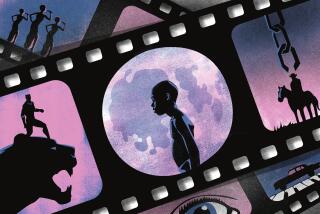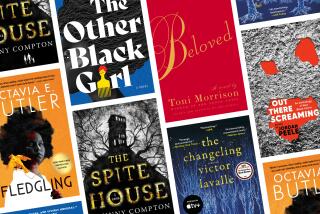BLACK MEN <i> by Haki R. Madhubuti (Third World Press, 7524 S. Cottage Grove Ave., Chicago, Il. 60619: $29.95, cloth; $14.95, paper; 273 pp.)</i>
- Share via
This book is a call for serious Afrikan American men to stand tall and dare to be great, dare to move beyond the limited ideas of others, dare to think for yourselves, for the future. dare to conceive a world where you are more than a consumer, a buyer a clown in purple wearing odd clothes finding glory in not being black.
Author Haki R. Madhubuti offers this poem in the introduction to his book about black men. He goes on to dare black men “to be beauty, dare to be creative first, dare to be husbands and fathers, to be quiet life fighters with a smile . . . dare.”
Madhubuti uses a variety of approaches--poetic verses along with essays, interviews and biographical sketches--to paint a startling portrait of black manhood, black family and black male-female relationships. His interview with a black Chicago police officer about his encounters with his own community--and the overall attitude of young black males on the streets of that city--offer insight into the desperate plight of young black Americans. In the tradition of Martin Luther King Jr. and Malcolm X, Madhubuti proposes solutions to the ills that plague black Americans through the restoration of the family unit and the development of an autonomous economic community.
Though some of Madhubuti’s accusations against white Americans may seem questionable to the reader, such as his acceptance of the argument that the AIDS virus was developed by the World Health Organization, his book does contain concrete and practical advice on everything from finances to diet and exercise.
Madhubuti’s analysis of black America is frank and earnest, and does not shy away from calling into account current black leaders. He points out that black leaders in this country seem to be above reproach and criticism. Nor does he shy away from the issue of the strong black female, stating emphatically that it is the black woman who has held the culture together.
Anyone interested in viewing the black male struggle from the inside should read this book.
More to Read
Sign up for our Book Club newsletter
Get the latest news, events and more from the Los Angeles Times Book Club, and help us get L.A. reading and talking.
You may occasionally receive promotional content from the Los Angeles Times.








